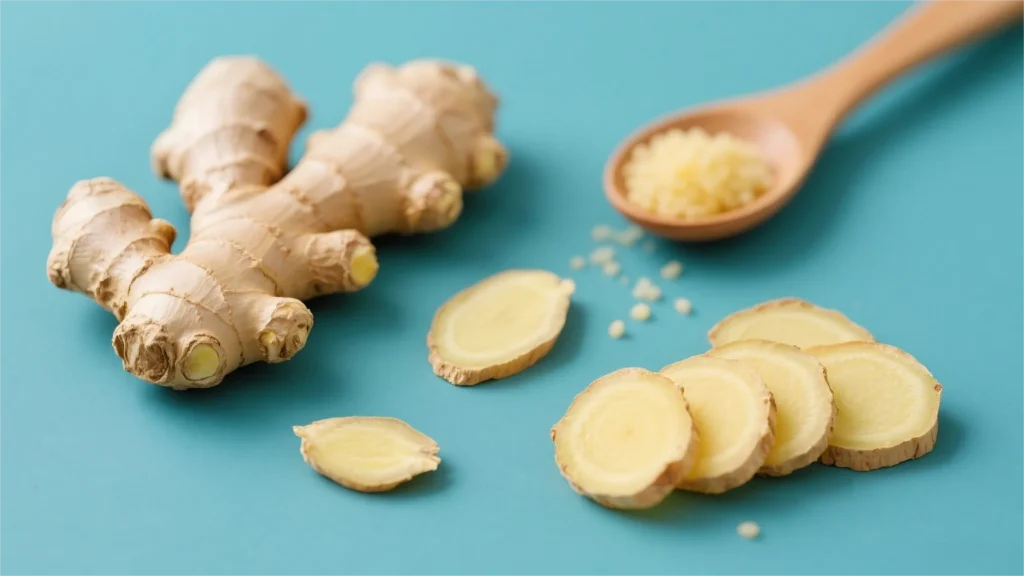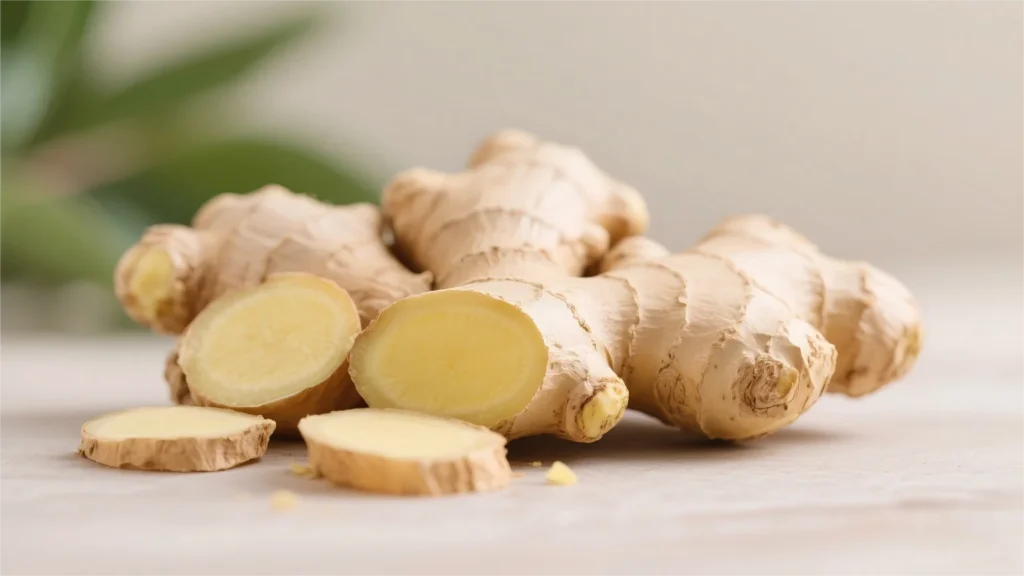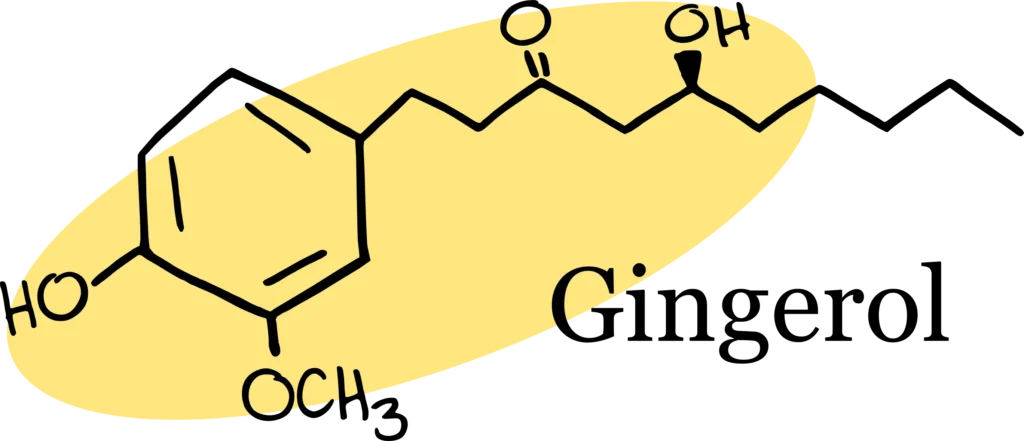¿Busca una forma natural de controlar las inflamaciones cotidianas, calmar el malestar estomacal o aliviar las agujetas después del entrenamiento? Seguro que has oído que el jengibre es bueno para la salud, pero el verdadero poder de esta raíz milenaria reside en un potente compuesto bioactivo: Gingerol.
No se trata de una moda de bienestar más. El gingerol es la "inteligencia activa" respaldada por la ciencia que confiere al jengibre sus propiedades medicinales. En esta guía exhaustiva, nos desharemos del ruido y le ofreceremos una comprensión clara y práctica de lo que es el gingerol, cómo funciona y cómo puede utilizarlo eficazmente para mejorar su salud.
¿Qué es el Gingerol frente al Shogaol? Comprender el verdadero poder del jengibre
El sabor picante del jengibre es un signo de la acción de potentes compuestos bioactivos. Pero no todo el jengibre es igual, y la forma en que lo consumas cambia radicalmente su principal ingrediente activo.
Gingerol: el compuesto clave del jengibre fresco
La estrella del jengibre fresco y crudo es [6]-gingerol. Es el compuesto más abundante y estudiado de la raíz cruda, responsable de gran parte de sus famosos efectos contra las náuseas y antiinflamatorios. Cuando exprimes jengibre fresco o lo añades a un batido, recibes una dosis directa de esta potente molécula de sabor picante.
Shogaol: El potente compuesto formado por el calor y el secado
Sin embargo, cuando el jengibre se seca o se calienta ocurre algo fascinante. El gingerol sufre una transformación química, convirtiéndose en una nueva familia de compuestos llamados shogaols.
No se trata de una pérdida de potencia; en muchos sentidos, es un cambio estratégico.
Los shogaoles están muy concentrados en formas secas como el jengibre en polvo y muchos suplementos. Las nuevas investigaciones sugieren que los shogaoles pueden poseer propiedades antiinflamatorias y neuroprotectoras aún más potentes que el gingerol. Esto explica por qué el "calor" del jengibre seco es diferente: es un calor más profundo y persistente, un signo de la presencia del shogaol.
La conclusión es sencilla: El jengibre fresco (rico en gingerol) es la mejor opción para combatir las náuseas. El jengibre seco o un suplemento estandarizado (más alto en shogaoles) pueden ser una mejor opción para combatir la inflamación crónica.
Los 8 beneficios del gingerol para la salud más avalados por la ciencia
Aunque el jengibre tiene docenas de usos tradicionales, la investigación moderna se ha centrado en varias áreas clave en las que sus compuestos activos resultan muy prometedores.
1. Un potente antiinflamatorio natural
La inflamación crónica es una de las causas fundamentales de muchas enfermedades. Se ha demostrado que el gingerol inhibe las vías inflamatorias del organismo, como las vías COX-2 y NF-κB, ayudando a reducir la inflamación sistémica.
2. Alivio probado para muchos tipos de náuseas
Este es uno de los usos más validados del jengibre. El gingerol es increíblemente eficaz para aliviar las náuseas y los vómitos, ya sean los provocados por las náuseas matutinas durante el embarazo, el mareo por movimiento o las inducidas por la quimioterapia. Parece que actúa bloqueando los receptores de serotonina en el intestino.
3. Alivia el dolor y las molestias de la artrosis
Para quienes luchan contra el dolor articular, el gingerol ofrece una alternativa natural convincente. Múltiples estudios han demostrado que los extractos concentrados de jengibre pueden reducir significativamente el dolor y la rigidez en personas con artrosis de rodilla.
4. Alivia el dolor muscular inducido por el ejercicio
El dolor muscular de aparición retardada (DOMS) que se siente después de un duro entrenamiento se debe en parte a la inflamación. Los estudios han descubierto que la suplementación diaria con jengibre puede reducir moderadamente este dolor muscular, ayudándote a recuperarte más rápido.
5. Ayuda a estabilizar los niveles de azúcar en sangre
Las nuevas investigaciones son increíblemente prometedoras para la salud metabólica. Los estudios sugieren que el jengibre puede reducir los niveles de azúcar en sangre y mejorar diversos factores de riesgo de cardiopatías en personas con diabetes de tipo 2.
6. Un remedio natural para el dolor menstrual
Para las mujeres con menstruaciones dolorosas (dismenorrea), el gingerol puede cambiar las reglas del juego. Las investigaciones han demostrado que tomar polvo de jengibre al principio del periodo menstrual es tan eficaz como los analgésicos habituales, como el ibuprofeno.
7. Favorece una digestión sana y eficaz
El gingerol ayuda a acelerar el vaciado del estómago, lo que puede ser beneficioso para las personas con indigestión crónica y molestias relacionadas.
8. Combate ciertas bacterias nocivas
Los compuestos bioactivos del jengibre pueden ayudar a inhibir el crecimiento de varios tipos de bacterias, incluidas las bacterias orales relacionadas con enfermedades inflamatorias de las encías como la gingivitis y la periodontitis.
Gingerol frente a los AINE (ibuprofeno): Una comparación práctica
Muchas personas recurren a los antiinflamatorios no esteroideos (AINE), como el ibuprofeno, para aliviar el dolor. ¿Cómo funciona el gingerol?
- Mecanismo: Los AINE bloquean las enzimas COX, que intervienen en la señalización del dolor. El gingerol actúa de forma más amplia, influyendo en múltiples vías inflamatorias.
- Efectos secundarios: El uso prolongado de AINE está relacionado con problemas gastrointestinales como úlceras y hemorragias. En general, el gingerol se tolera bien, aunque en dosis elevadas puede provocar ardor de estómago leve.
| Característica | AINE (Ibuprofeno) | Gingerol / Extracto de jengibre |
|---|---|---|
| Uso principal | Dolor agudo e inflamación | Inflamación crónica, náuseas, dolores musculares |
| Velocidad de acción | Acción rápida (30-60 minutos) | Efecto acumulativo más lento para el dolor |
| Salud intestinal | Puede dañar el revestimiento del estómago | Generalmente protector del intestino |
| Lo mejor para | Dolores de cabeza, lesiones agudas | Artritis, dolores menstruales, DOMS |
Su guía práctica para utilizar eficazmente el Gingerol
Una cosa es conocer los beneficios y otra conseguirlos. He aquí cómo hacerlo bien.
¿Fresco, polvo o suplemento? Cómo elegir
- Para las náuseas y la digestión: Utilice jengibre fresco. Haz té, rállalo en platos o exprímelo.
- Para la artritis y el dolor crónico: Utilice jengibre seco en polvo o un suplemento estandarizado para obtener una dosis más concentrada de shogaoles antiinflamatorios.
- Para el dolor muscular: Se ha demostrado que una dosis diaria constante, ya sea en polvo o en suplementos, es eficaz.
El secreto de la biodisponibilidad: 2 formas sencillas de absorber más
El cuerpo no absorbe perfectamente el gingerol por sí solo. Se puede potenciar significativamente su absorción con dos simples adiciones:
- Piperina (de la pimienta negra): Un compuesto de la pimienta negra puede aumentar la absorción de muchos nutrientes, incluido el gingerol.
- Grasas saludables: Consumir jengibre con grasas (como aguacate, aceite de oliva o frutos secos) también puede mejorar su biodisponibilidad.
Qué dicen los estudios sobre la dosis
No existe una dosis oficial recomendada, pero los estudios clínicos suelen utilizar entre De 500 mg a 2.000 mg de extracto o polvo de jengibre al día, a menudo dividido en dosis más pequeñas. Para el jengibre fresco, hasta 1-2 pulgadas de raíz diaria es una sugerencia común.
Cómo comprar un suplemento de gingerol de alta calidad: Lista de comprobación en 4 pasos
El mercado de los suplementos puede ser confuso. Utilice esta lista de comprobación para hacer una elección inteligente.
- Busque "Extracto estandarizado".: Esto asegura que cada cápsula contiene una cantidad constante y garantizada de compuestos activos. Busque productos estandarizados con al menos 5% gingeroles.
- Comprobar el porcentaje de gingerol (%): Un mayor porcentaje significa un producto más potente. Evite los suplementos que sólo indican "polvo de raíz de jengibre" sin estandarizar.
- Verificar las pruebas de terceros (USP, NSF): Los sellos de organizaciones como USP (U.S. Pharmacopeia) o NSF International significan que el producto ha sido sometido a pruebas independientes de pureza y potencia.
- Evitar rellenos innecesarios: Un buen suplemento debe tener una lista de ingredientes limpia, sin colorantes artificiales, estearato de magnesio u otros aditivos innecesarios.
La seguridad ante todo: Posibles efectos secundarios y quién debe ser precavido
El jengibre es abrumadoramente seguro, pero no es para todo el mundo.
- Efectos secundarios generales: En dosis muy altas, el jengibre puede causar ardor de estómago leve, diarrea y malestar estomacal.
- Advertencias críticas: Debe hablar con su médico antes de tomar suplementos de jengibre si:
- Toma anticoagulantes (por ejemplo, warfarina): El jengibre puede tener un ligero efecto anticoagulante.
- Tiene cálculos biliares: El jengibre puede aumentar el flujo biliar, lo que podría causar problemas.
- Está embarazada: Aunque el jengibre es eficaz contra las náuseas matutinas, consulte a su médico antes de tomar suplementos concentrados.
Preguntas frecuentes
P: ¿Cuál es la mejor forma de tomar gingerol a diario?
R: Para el bienestar general, es excelente incorporar jengibre fresco o en polvo a su cocina diaria o preparar un simple té de jengibre. Para obtener beneficios terapéuticos específicos, un suplemento estandarizado es más fiable.
P: ¿La cocción destruye el gingerol?
R: No lo destruye, pero lo transforma en shogaol. Ambos son beneficiosos, pero con fines primarios diferentes.
P: ¿Es mejor el gingerol que la cúrcuma (curcumina)?
R: Son diferentes pero complementarios. Ambos son potentes antiinflamatorios que actúan en diferentes vías. Muchas personas encuentran que tomarlos juntos proporciona un efecto sinérgico.
Lo esencial: Gingerol a su servicio
El gingerol es un potente compuesto respaldado por la ciencia que ofrece una forma natural y eficaz de combatir la inflamación, el dolor y las náuseas. Conociendo las diferencias clave entre las formas de jengibre y cómo utilizarlas estratégicamente, podrás liberar todo el potencial de esta increíble especia.
Empiece por incorporar más jengibre a su dieta y, si tiene algún problema de salud específico, considere la posibilidad de tomar un suplemento estandarizado de alta calidad tras consultar con su profesional sanitario.



